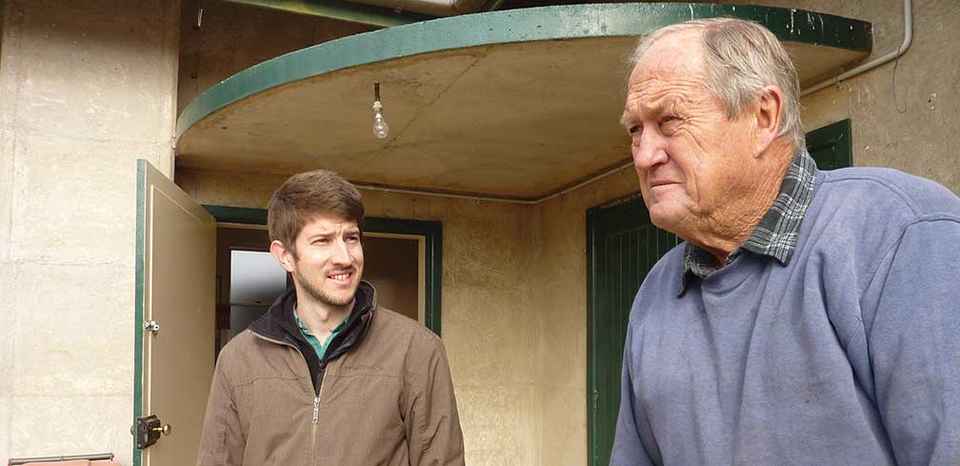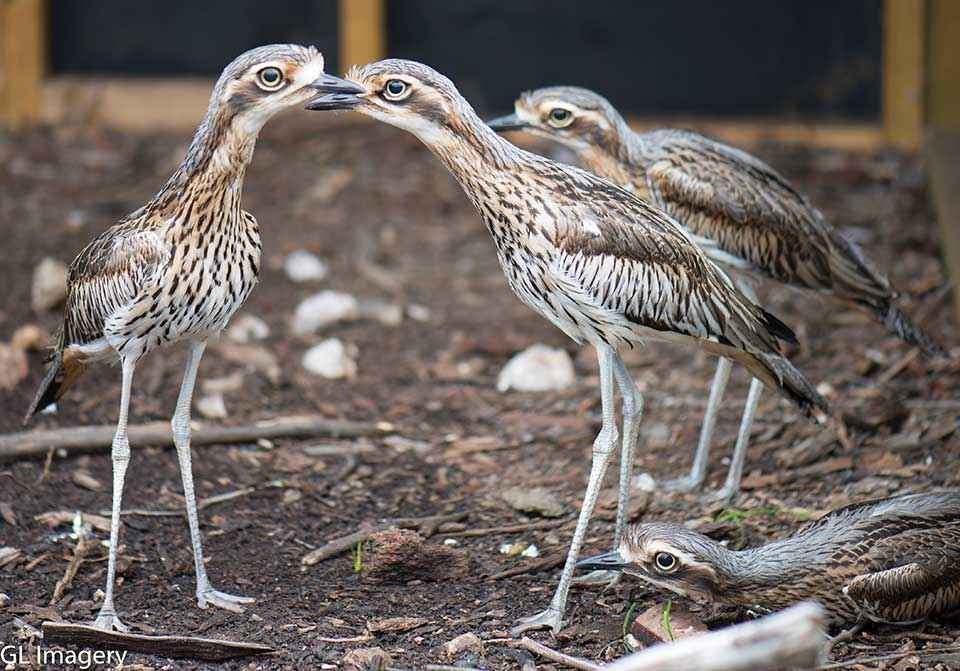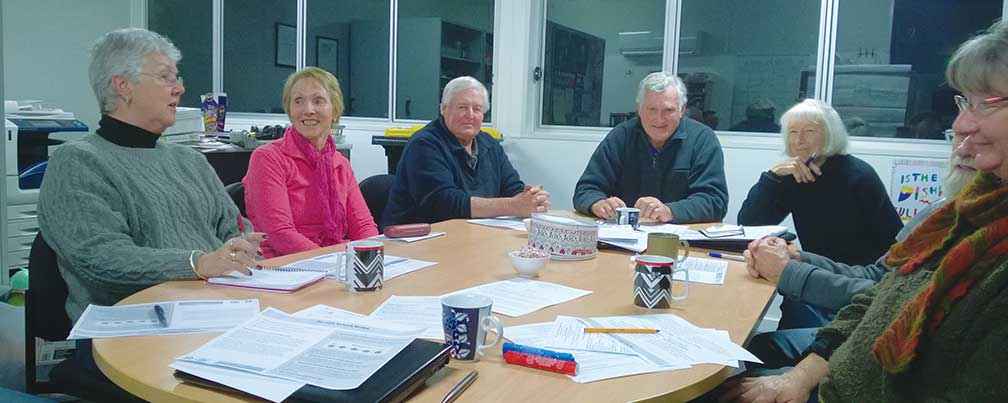Victorian Landcare Magazine - Winter 2018, Issue 72

Loddon Plains Landcare Network
A few years ago, I drove to Durham Ox in north-central Victoria to meet with Anthony Gallacher, the then Landcare facilitator for the Loddon Plains Landcare Network, which supports 18 local Landcare groups, and network chair, Laurie Maxted. Laurie had been in the district for 50 years, Anthony two years. I was starting a project to support learning within the Landcare movement, and Anthony and Laurie had agreed to share with me what they were learning about running a network.
After our discussion Anthony drove me around to some revegetation projects. I asked who he was using to bounce ideas off. Who understands the business of supporting Landcare groups and running a network? Not very many people at all, it turned out. Anthony was mostly talking to himself. And Laurie knew everyone locally, but he didn’t have many Landcare people he could talk to outside his area.
Anthony and Laurie’s experience is not unusual. Landcare lacks strong networks outside localities, and places where we can meet and talk as peers – that is, as equals, Landcarer-to-Landcarer.
Landcare has good connections to technical knowledge about soils, land management, revegetation and the scientific side of Landcare. But we have never developed the same connections for social knowledge.

Above: The Mid Loddon Landcare Network’s curlew breeding program has attracted many new volunteers.
The importance of social knowledge
Landcare has good connections to technical knowledge about soils, land management, revegetation and the scientific side of Landcare. But we have never developed the same connections for social knowledge. Social knowledge is what it takes to organise action in communities, to set up collaboration between organisations and to influence agendas. Alongside our biophysical knowledge, it’s the other half of Landcare knowledge, and as our communities change and our politics tumble forward, it’s the knowledge Landcare needs to survive and prosper.
Unfortunately, a lot of that social knowledge is locked up in localities. We operate in isolation from each other. We often don’t have time to talk with each other, we don’t have places to talk, and we operate in a natural resource management culture where the scientific is dominant over the social.
Landcare Victoria Incorporated is researching how the Landcare community can share its social knowledge, with a project called CLEA – Community Learning for Environmental Action. The Natural Resources Conservation League, a philanthropic organisation focused on capacity building, and the Australian Government’s National Landcare Program, are our funding partners.
CLEA is now in its fourth year. Our approach has been to take action and find what works – to design something we think will help, test this in action, and then build on it. This is a summary of what we have learnt:
1. Peer-to-peer inquiry means reaching in and reaching out
CLEA has developed three facilitated sessions for Landcare network committees of management to talk as peers about the future of their network. Where do they need to break new ground, to stay viable and vigorous? Inquiry starts with a clear question addressing a shared challenge, and the committee learns to frame a question even when there are no easy or obvious answers. They then review how that challenge has been approached in the past and what can be done now to open up the options that will lead to answers.
It is tough work, to reach in and find the question and then to reach out to others with that question. Over the months that follow, the committee of management keeps track of the new approaches being taken, to find what works and implement it and then to develop their next question. CLEA is now supporting seven Landcare networks across Victoria as they work on what CLEA calls their ‘Question Without an Easy Answer’.
2. Peer-to-peer inquiry needs its own time and space
The CLEA sessions make time and space for a committee to think about the network’s long-term future, something that is difficult to do when immediate demands crowd the meeting agenda. CLEA has also been working with Landcare Victoria Inc.’s statewide forums, to introduce new ways for Landcare members and staff to share knowledge, solve problems, and open up critical thinking between peers.
3. Peer-to-peer inquiry is big
Peer-to-peer inquiry means stepping aside from the top-down communication based on hierarchy and connecting to each other laterally – as peers. Our individual passions lead us forward, and together we’re inventing new ways to create and learn.
Co-inquiry and co-design are ways of jointly understanding our situation and doing things differently. Through mentoring you, an experienced person, help me, a less experienced person, as I develop my practice. In coaching I am developing a specific skillset, while the coach instructs and gives feedback.
CLEA is getting people together to talk more, online and face-to-face, talking, talking, a river of talk flowing in all directions, unbounded by the organisations we happen to work for, self-organising around our passion for our practice. What works? What’s problematic? What needs to be developed, what needs to be challenged? We’re all at the start of a very big learning curve!
Ross Colliver is the CLEA Organiser.
For further information: contact Ross at ross.colliver@bigpond.com

Above: The Mid Loddon Landcare Network Committee discussing the network's long-term future.
Two questions from the Mid Loddon Landcare Network
The Mid Loddon Landcare Network is made up of six Landcare groups and one conservation management network, situated west of Bendigo. Its members are established farming families and blockies, all with an eye on looking after their bit of country.
The network’s first CLEA session was squeezed into a regular committee meeting in 2015. The question the network came up with was: how do we get city folk to understand and appreciate farmers’ issues?
Fast-forward to 2017 and the network and their indefatigable Landcare facilitator Judy Croker have developed a number of ways to connect to environmental enthusiasts from Bendigo and Melbourne. The network’s curlew breeding program has been like a honey pot – attracting lots of people that want to help, but also creating the challenge of organising volunteers.
The network has now gone on to a new question: how do we mobilise advocacy for a healthy landscape? The network doesn’t want to front the advocacy, but it knows a lot about the impact of ill-considered urban expansion and can support an advocacy organisation.
Influencing urban development is a genuinely tough question, one that more than a few Landcare networks are worrying about. CLEA can help bring those networks together to talk as peers about what they are learning about meeting this challenge.
Ross Colliver is the CLEA Organiser.
For further information: contact Ross at ross.colliver@bigpond.com